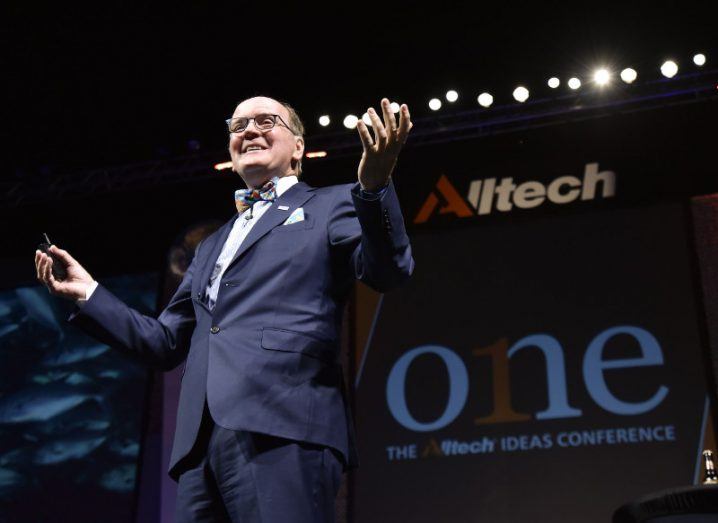This week Alltech, the animal nutrition and health company, launched the first cohort of its new accelerator program. The Pearse Lyons Accelerator is named after Alltech’s founder and president, who has taken the business from a startup in 1980 to a multinational business, which turned over $2 billion last year.
The program received applications from nearly 200 businesses across 38 countries globally but took on just 10. They are:
Agrilyst (USA) is a farm management and data analytics software tool for indoor farmings.
AgriWebb (Australia) is a mobile herd & farm management application for cattle, sheep, and wool producers.
Alesca Life (China) developed a concept called farming-as-a-service that allows scalable, localized food production for commercial and retail customers.
eFishery (Indonesia) is an automated fish feeder that can sense the fish’s appetite and adjust the amount of feed given.
GreenGage (UK) provides LED lamps to serve the farming industry.
Hargol FoodTech (Israel) has developed methods and technology to grow large quantities of grasshoppers quickly in captivity.
MagGrow (Ireland) has created magnetic spraying system to help row crop farmers apply inputs and reduce drift by over 80%.
MooCall (Ireland) is an animal wearable that accurately predicts when a cow is going to give birth and communicates this back to the farmer through text message
SkySquirrel (Canada) operates a drone-based crop analytics company that monitors crop health, with a primary focus on improving crop yields and reducing costs at commercial vineyards
Tevatronic (Israel) has developed an automated irrigation and fertilization technology. The system is capable of deciding when and how much to irrigate, and it executes the irrigation decision autonomous.
Funding is Not the Answer
Originally planning to put an internal €10 million fund to work to invest equity in the cohort, Alltech and its accelerator partner Dogpatch Labs discovered that many startups were not actually looking for equity investment.
“Many of the companies that came to us already had plenty of funding themselves — on average $3 million each — so they weren’t attracted by the funding opportunity; they were more concerned about getting their product into the market and getting some sales,” said Aidan Connolly, chief innovation officer at Alltech. “So they were looking for access to markets and customers as well as gaining market knowledge. Since Altech is present in 129 countries globally, it has a great understanding of where and how to promote technologies.”
The 15-week program will focus around mentorship, including access to Lyons himself, collaborative learning, and finding new business or partnership opportunities, according to Patrick Walsh, managing director of Dogpatch Labs, which is also providing coworking space for the cohort.
Partly virtual, the program started this week with structured workshops in Dublin, followed by weekly calls when the startups return to their respective markets, and two further in-person sessions halfway through the program and again at the end. Alltech is giving each startup a €15k grant to pay for flights and hotel rooms during their time in Dublin.
The program culminates in May at ONE: The Alltech Ideas Conference in Lexington, Kentucky in the USA, where the startups will have the opportunity to present in front of 3k people.
“This high-profile event will give the startups the opportunity to demo their ideas in front of potential customers and distributors,” said Connolly.
So What’s In It for Alltech?
Thought leadership, argues Connolly.
“ONE has been the preeminent event of its type for the last 30 years and is the place to go for new ideas,” he said. “While we’d love to have a monopoly on all new ideas, we felt launching this accelerator program and then bringing the accelerator startups to the event was a great way to maintain the idea of Alltech as a thought leader in the space.”
The accelerator will also help Alltech keep up with the latest innovation internally. While not all of the technology is relevant to Alltech’s core business in animal health, Connolly argues that there are increasing overlaps between new technologies and what the company does.
Alltech also hopes the startups will be able to add value to their customers.
“We aren’t necessarily seeing these startups as a way for us to make money, but they could be something our customers and collaborators can tap into to make them more profitable,” said Connolly.
The company has invested in tech startups in the past and wouldn’t preclude the possibility of investing in one of the startups later down the line if tech was a good bolt-on to its existing nutritional and health products for animals. But Connolly emphasized this was not a core focus of the program.
How Did Alltech Choose the Final 10?
Of the 184 companies that applied, about 170 were viable, so it was very difficult to get that number down to 10, said Connolly.
“We tried to reflect the areas we thought were most of interest,” he said, adding that a LinkedIn blog post he recently published entitled 8 Disruptive Digital Technologies with the Power to Transform Agriculture, was downloaded 8k times in 60 days.
“That shows you how hot this area is,” he added.
The company picked companies from across the agtech spectrum and avoiding choosing two in the same area to avoid any competitive issues. The accelerator is also geographically diverse with companies coming from seven different countries.
For more about if and when venture capital funding is suitable for your agritech startup, read AgDNA CEO Paul Turner’s guest commentary on the subject here.





